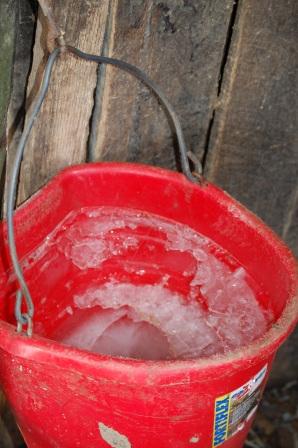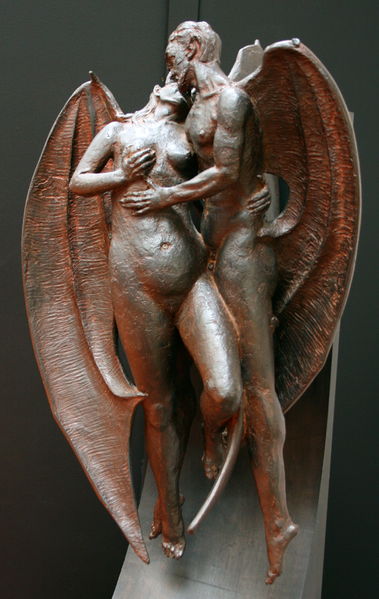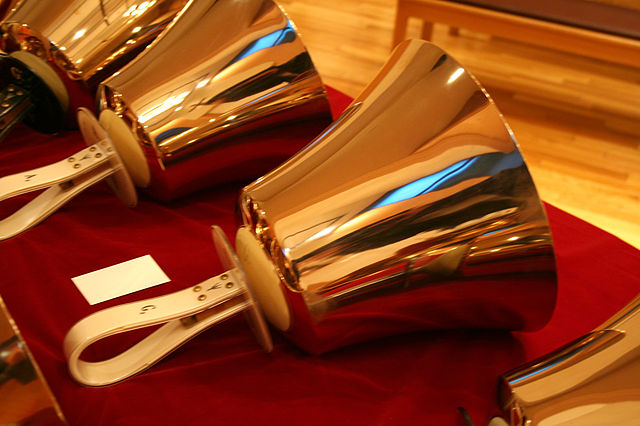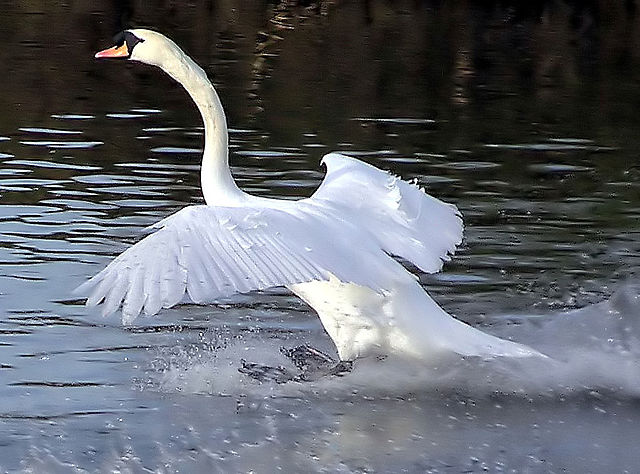Sometimes my lord confines me firmly,
then sends me under the broad embrace
of the prosperous plain, and pushes me to a halt,
he restrains some of my power in darkness,
5 violently in confinement, where my keeper, earth,
presses on my back. I have no escape
from that oppression, but I shake
the dwelling place of heroes; the gabled halls tremble,
the homes of men, the walls wobble,
10 steep over the householders. The air over the land
seems still and the ocean is silent,
until I burst forth from my confinement,
even as he instructs me, he who first laid
fetters upon me at creation,
15 bonds and chains, so that I might not bend
from the power that shows me my path.
Sometimes I must excite the waves from above,
stir up the streams and drive to the shore
the flint-grey flood. The foamy water
20 struggles against the wall, a dark mountain
rises up over the deep; dark in its track,
another goes, mixed with the sea,
so that they meet near the borderland,
the high banks. There the wood is loud,
25 the cry of the sea-guests, the steep stone-cliffs
quietly await the watery war,
the dashing of waves, when the lofty tumult
crowds onto the cliffs. There the ship is in expectation
of a fierce fight, if the sea bears it
30 at that terrible time, full of souls,
so that it must be deprived of control
robbed of life, the foamy one [must] ride
the backs of the waves. There a certain terror is
made visible to men, that which I must obey,
35 strong on the harsh path. Who stills that?
Sometimes I rush through, so that a dark water-vessel
rides on my back, I drive apart
the cups of water widely, sometimes I let
them slide together again. That is the greatest of clamours,
40 sounds over the cities, and the loudest of clashes,
when a sharp cloud comes against another,
edge against edge; the dark creatures
eager over the people bleed fire,
bright flame, and the clamour travels
45 dark over the people with a great din,
they go fighting, allow to fall
dark drops, humming, from the compass [of the clouds],
moisture from the belly. A terrible troop travels,
toiling; fear rises up,
50 a great mind-torment for mankind,
terror in the cities, when dark phantoms,
spreading out, shoot with sharp weapons.
The foolish one does not dread the death-spear,
and yet he dies, if the true measurer,
55 according to his right, allows an arrow
to fly through the rain from the tempest above,
a traveling dart. Few escape that,
of those whom the weapon of the racing guest reaches.
I establish the start of that strife,
60 when I go through the crush to force
the cloud-conflict with great strength
over the compass of the stream. Loudly the lofty
crowd crashes; then afterwards I sink
under the helmet of the air near the land,
65 and load up something I must have onto my back,
recovered with the strength of my lord.
Thus I, powerful servant, contend at times,
sometimes under the earth, sometimes I must
descend beneath the humble waves, sometimes above the hill
70 I stir up streams, sometimes I rise up,
excite the cloud-journey, I travel widely,
swift and strong of substance. Say what I am called,
or who raises me, when I may not rest,
or who stays me, when I am still.







Commentary for Exeter Riddles 1-3
MEGANCAVELL
Date: Thu 21 Mar 2013Matching Riddle: Exeter Riddle 1
Riddles 1 to 3 are quite clearly thematically linked, and it is because of this that they have also been read as one very long riddle (especially because Riddle 2 and the sections of Riddle 3 begin with the same word: Hwilum (sometimes)). This, of course, throws off the riddle numbering system (which you should note is an editorial practice and does not appear in the Exeter Book manuscript). For this website’s purposes, we’re sticking to the old school riddle numbering (i.e. the one in Krapp and Dobbie’s edition – see the About the Exeter Book page for more on this) because this is the system most online riddle resources use.
As for solutions (1), you may have noticed that the same ones crop up for each of the three related riddles. They are all commonly solved as Storm or Wind, but this doesn’t come close to covering all the potential solutions (scholars like to disagree). Other suggestions include Atmosphere, Power of Nature, Sun (esp. for riddles 2 and 3) and all manner of different types of storms (including Apocalyptic Storm, Hurricane, Earthquake, Storm at Sea and Thunderstorm). Riddle 1 has also been solved as Fire and Raiding Party or Army, while Riddle 2 has been solved as Anchor and Riddle 3 as Revenant. In addition to the stormy weather solutions, another trend can be seen throughout the riddles and that relates to religion. This is unsurprising considering the Exeter Book was donated to a cathedral library by a bishop – in fact, most early English literature has a strong religious connection because of the structure of this society and its scribal culture (think monasteries!). So, this religious trend has resulted in the following solutions: Riddle 1 as God, Riddle 2 as Christ and Riddle 3 as Cross, Spirit and Supernatural Force.
Having read a good chunk of Old English poetry, it seems pretty clear that each of the three riddles does possess religious connotations. All this talk of leaders controlling the destructive action of whatever þrymful þeow (powerful servant) is narrating definitely signals a divine entity. In fact, these poems echo in some ways the verse lines of the Old English translation of Boethius’ Consolatione philosophiae (Consolation of Philosophy). A section from Metre 20 (lines 63-74), which deals with the elements, reads:
Habbað þeah þa feower frumstol hiora,
æghwilc hiora agenne stede,
þeah anra hwilc wið oðer sie
miclum gemenged and mid mægne eac
fæder ælmihtiges fæste gebunden,
gesiblice, softe togædre
mid bebode þine, bilewit fæder,
þætte heora ænig oðres ne dorste
mearce ofergangan for metodes ege,
ac [geþweorod] sint ðegnas togædre,
cyninges cempan, cele wið hæto,
wæt wið drygum, winnað hwæðre. (2)
(Nevertheless each of the four have their proper station, their own place, although each of them may be greatly mixed with the other and also, by the might of the almighty father, bound fast, peaceably, gently together by your decree, merciful father, so that none of them dared to go over the other’s boundary because of fear of the lord, but the retainers are made to agree, the champions of the king, cold with heat, wet with dry, yet they compete.)
Rambunctious elements! Photo (by Terry Lucas) from Wikimedia Commons (licence: CC BY 3.0).
The rest of the poem goes on to discuss God’s control over the elements, which is again mentioned in relation to binding a hundred lines later:
Hafað fæder engla fyr gebunden
efne to þon fæste þæt hit fiolan ne mæg
eft æt his eðle þær þæt oðer fyr
up ofer eall þis eardfæst wunað. (153-56)
(The father of angels has bound fire precisely so fast that it may not return to its homeland where that other fire, up over all this, remains firmly fixed.)
Riddle 3’s focus on confinement in particular maps nicely onto this Boethian vision of the cosmos. It’s also noteworthy that Riddles 2 and 3 end with a similar challenge to the listener: the riddler not only asks what is narrating the poem, but also what is controlling the speaker:
Saga, þoncol mon,
hwa mec bregde of brimes fæþmum,
þonne streamas eft stille weorþað,
yþa geþwære, þe mec ær wrugon. (12b-15)
(Say, thoughtful one, who draws me from the depths of the ocean, when the streams become still again, obedient the waves, which earlier concealed me.)
and
Saga hwæt ic hatte,
oþþe hwa mec rære, þonne ic restan ne mot,
oþþe hwa mec stæðþe, þonne ic stille beom. (72b-4)
(Say what I am called, or who raises me, when I may not rest, or who stays me, when I am still.)
Although Riddle 1 doesn’t end this way, it does include a reference to the powers that control it:
heahum meahtum
wrecen on waþe, wide sended (10b-11).
(pressed into wandering / by the powers on high, sent afar).
This all seems to suggest that the solution calls for a master-servant duo. And so, perhaps God and the Elements (or in Old English: God ond þa Feower Gesceafta) would make a nice solution for all three of these poems. Of course, the poet seems to prefer the destructive aspect of each element…but without central heating, this isn’t particularly surprising!
(1) For a convenient list of solutions and solvers, see Donald K. Fry’s article, “Exeter Book Riddle Solutions,” Old English Newsletter 15.1 (1981), pp. 22-33, although unfortunately and for obvious reasons it does not take into account suggested solutions after 1981.
(2) These lines are quoted from the brilliant, new-ish edition by Malcolm Godden and Susan Irvine, The Old English Boethius: An Edition of the Old English Versions of Boethius’s De Consolatione Philosophiae, 2 volumes (Oxford: Oxford University Press, 2009). The translations, along with this post, are by Megan.
Tags: anglo saxon exeter book riddles old english solutions riddle 1 riddle 2 riddle 3
Related Posts:
Exeter Riddle 2
Exeter Riddle 3